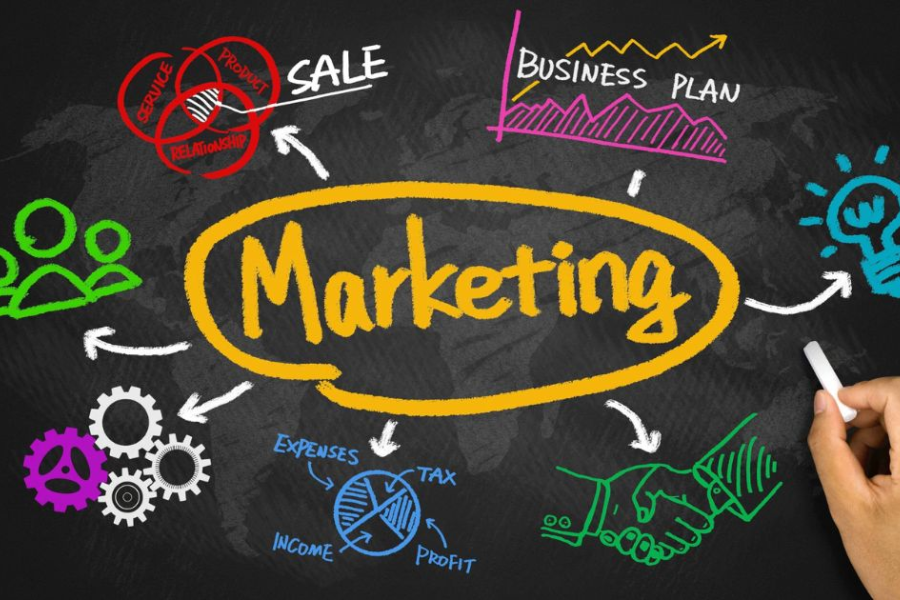The Hidden Impacts of the Insidious Proliferation of Modern Marketing
Understanding the Evolution of Marketing in the Digital Age
Marketing today looks vastly different from what it was just a few decades ago. The traditional methods of relying on print ads, billboards, and television commercials have given way to more sophisticated digital strategies. Today, brands leverage data analytics, artificial intelligence, and machine learning to reach consumers with an accuracy the Insidious Proliferation of Modern Marketing and precision that was previously unimaginable.
This transformation has been largely driven by the rise of the internet and the amount of time people spend online. Digital platforms give marketers access to valuable insights into consumer preferences and behaviors, allowing them to craft more personalized and effective messages. As a result, businesses can now engage their audiences the Insidious Proliferation of Modern Marketing with greater efficiency and at a much lower cost.
Personalization: A Game Changer in Modern Marketing
One of the most important shifts in modern marketing is the move towards personalization. Instead of broadcasting a generic message to a the Insidious Proliferation of Modern Marketing broad audience, brands now use data to create individualized experiences for each customer. This trend has proven to be incredibly effective in attracting and retaining consumer interest.
Personalized marketing can take many forms, whether it’s product recommendations based on past purchases or targeted email campaigns that address consumers by name. By offering content that resonates with a person’s unique preferences, brands can build stronger relationships with their customers. However, this approach also raises concerns about privacy, as consumers become more conscious of how their data is being used. This has led to a growing demand for transparency and control of the Insidious Proliferation of Modern Marketing over personal information.
Social Media’s Role in the New Marketing Landscape
Social media has become one of the most powerful tools in a marketer’s arsenal. Platforms like Facebook, Instagram, Twitter, and TikTok provide the Insidious Proliferation of Modern Marketing a direct line to consumers, making it easier to engage with them on a personal level. These platforms offer a unique opportunity to build brand loyalty, promote products, and even drive sales.
With the ability to create and share content quickly, social media has leveled the playing field for businesses of all sizes, allowing even small companies to reach large audiences. However, this ease of access comes with the challenge of maintaining authenticity. In a space flooded with constant promotional content, consumers can the Insidious Proliferation of Modern Marketing quickly grow tired if they feel bombarded by ads. Brands need to strike a balance between engagement and promotion to avoid losing their audience.
The Rise of Influencer Marketing
In recent years, influencer marketing has taken off, with brands partnering with social media personalities to reach specific groups of consumers. Influencers, who often have large and loyal followings, lend an element of trust and authenticity the Insidious Proliferation of Modern Marketing to a brand’s messaging. This approach allows businesses to tap into niche markets and connect with audiences in a more organic way.
However, this strategy isn’t without its challenges. Consumers are increasingly skeptical of content that blurs the line between genuine recommendations and paid promotions. Additionally, the sheer volume of sponsored content can make it difficult for brands to stand out. To succeed, companies must carefully choose influencers whose values align with their brand and be transparent about their partnerships.
Content Marketing: Building Trust Through Value
Content marketing has become a cornerstone of modern marketing strategies. It involves creating valuable and engaging content to the Insidious Proliferation of Modern Marketing attract and retain customers. By providing information that solves problems or addresses consumer needs, brands can build trust and establish themselves as authorities in their industries.
Content marketing comes in many forms, including blogs, videos, podcasts, and social media posts. But with so much content competing for attention, businesses need to produce high-quality and consistent materials to stand out. The goal is to build long-term relationships with the audience by continually offering relevant and useful information.
The Growing Role of Data in Marketing
Data-driven marketing has revolutionized the way businesses connect with consumers. By analyzing real-time data, companies can fine-tune the Insidious Proliferation of Modern Marketing their strategies to be more effective and precise. Insights gathered from analytics enable brands to optimize campaigns, target the right customers, and measure success more accurately.
While this approach offers clear advantages, it also raises ethical concerns around data privacy. Consumers are becoming more mindful of how their information is being collected and used. Brands must not only use data responsibly but the Insidious Proliferation of Modern Marketing also ensure that they are transparent about their practices.
Digital Advertising: Opportunities and Challenges
Digital advertising has opened up new possibilities for businesses of all sizes. From pay-per-click ads to retargeting campaigns, digital platforms allow brands to reach consumers at a relatively low cost. However, the rapid growth of the Insidious Proliferation of Modern Marketing digital advertising has also led to increased competition, making it harder for companies to capture attention.
Brands must stay on top of changing algorithms and adapt their strategies to evolving consumer behavior. Additionally, they need to be mindful of ad fatigue, where overexposure to ads causes consumers to lose interest.
Artificial Intelligence in Marketing: A New Frontier
Artificial intelligence (AI) is playing an increasingly significant role in modern marketing. AI-powered tools allow businesses to analyze vast amounts of data, automate marketing processes, and offer personalized experiences to consumers at scale. From chatbots to predictive analytics, AI has transformed the way companies interact with their audience.
However, with AI comes concerns about privacy and ethics. Consumers worry about how much control they have over their personal Insidious Proliferation of Modern Marketing information and how AI might affect their experiences. Brands must find a balance between embracing AI’s capabilities and ensuring they address these concerns responsibly.
The Shift Toward Experiential Marketing
Experiential marketing is all about creating memorable, immersive experiences that connect with consumers on a deeper level. By offering the Insidious Proliferation of Modern Marketing unique, interactive events, brands can build stronger emotional ties with their audience, which helps foster loyalty.
This type of marketing has gained traction as people increasingly seek meaningful and authentic interactions with the companies they the Insidious Proliferation of Modern Marketing support. However, developing a successful experiential campaign requires creativity and a thorough understanding of the target audience’s desires and expectations.
Mobile Marketing: Engaging Consumers on the Go
As more people rely on their smartphones for daily activities, mobile marketing has become a crucial aspect of modern strategies. From mobile apps to location-based marketing, businesses can engage their audience wherever they are. the Insidious Proliferation of Modern Marketing However, the rise of mobile marketing also presents challenges such as maintaining user privacy and creating seamless experiences across different devices.
Brands must continually update their mobile strategies to keep pace with technological advancements and changing consumer expectations.
Thriving in an Ever-Changing Marketing Landscape
Marketing is constantly evolving, with new trends and technologies emerging all the time. To stay competitive, businesses must remain adaptable and open to experimenting with new approaches. By staying informed, agile, and the Insidious Proliferation of Modern Marketing committed to ethical practices, brands can continue to thrive in today’s dynamic marketing environment.
FAQs:
1. What does the “insidious proliferation of modern marketing” mean?
The term refers to the rapid, often subtle spread of marketing techniques that infiltrate various aspects of daily life, especially through digital and social media platforms. Marketing is now omnipresent, using data-driven and personalized tactics to engage consumers in ways that weren’t possible before.
2. How has marketing evolved over time?
Marketing has evolved from traditional methods like print ads and billboards to more digital, data-driven approaches. The rise of the internet, social media, and mobile technology has enabled brands to target consumers with greater precision and personalization.
3. Why is personalization so important in modern marketing?
Personalization helps brands deliver content and offers tailored to individual consumer preferences. This approach fosters stronger the Insidious Proliferation of Modern Marketing connections, leading to higher engagement, retention, and brand loyalty. However, it also raises concerns about data privacy and transparency.
4. What role does data play in marketing today?
Data is at the core of modern marketing. It helps companies understand consumer behavior, optimize campaigns, and create personalized experiences. Businesses use analytics and AI to make data-driven decisions that enhance customer targeting and overall campaign effectiveness.
5. How has social media impacted modern marketing?
Social media platforms have revolutionized marketing by providing direct access to consumers. Brands use these platforms to engage with audiences, promote products, and build communities. Social media has also paved the Insidious Proliferation of Modern Marketing the way for influencer marketing, a key trend in the industry.
6. What are the ethical concerns in modern marketing?
The rise of data-driven marketing has led to concerns about privacy, transparency, and the ethical use of consumer information. Brands must balance personalization and targeted advertising with responsible data collection and usage practices to maintain consumer trust.
7. How does AI impact modern marketing?
AI helps automate processes, predict consumer behavior, and personalize content at scale. However, the widespread use of AI in marketing raises questions about ethics, privacy, and the potential displacement of jobs in the industry.
8. What is experiential marketing, and why is it important?
Experiential marketing focuses on creating immersive, memorable experiences for consumers. It helps brands build deeper emotional connections with their audience, fostering loyalty through unique and interactive events.
9. What are the challenges of mobile marketing?
Mobile marketing presents opportunities to engage consumers on-the-go, but it also comes with challenges such as ensuring privacy, the Insidious Proliferation of Modern Marketing maintaining a seamless experience across devices, and adapting to constantly changing technology.
10. How can businesses stay competitive in the evolving marketing landscape?
To stay competitive, businesses must remain flexible, innovative, and willing to embrace new technologies and strategies. Keeping up with industry trends, maintaining ethical practices, and prioritizing consumer trust are key to thriving in modern marketing.
Conclusion
The proliferation of modern marketing has fundamentally changed how brands connect with consumers. From data-driven strategies and personalization to the rise of AI and social media, marketing has become more targeted, the Insidious Proliferation of Modern Marketing efficient, and, at times, insidious. While these advancements offer tremendous opportunities for brands, they also bring new challenges, including concerns about privacy, authenticity, and ethics.
As marketing continues to evolve, businesses must find a balance between leveraging cutting-edge tools and maintaining transparency and trust with their audiences. The future of marketing lies in the ability to adapt to changing consumer expectations while upholding ethical standards. Success in this landscape will depend on a brand’s ability to engage consumers in meaningful, respectful, and innovative ways.
Dive into engaging stories and the latest trends from the world of entertainment and beyond at Tamasha.blog.






